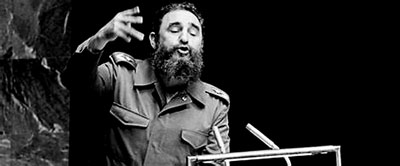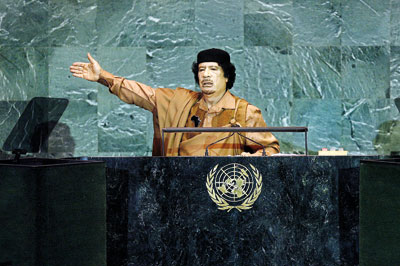Sunday Times 2
For democracy’s sake, should military leaders be ostracised and barred from the UN?
UNITED NATIONS – The recent military coup in Myanmar and an attempted palace coup in Jordan hark back to the days when insurrections by armed forces came along a veritable assembly line — particularly in Africa, Latin America and Southeast Asia.
And at least one political leader — a former Prime Minister of Thailand — was ousted from power when he was at the United Nations to address the General Assembly.
After he finished his address, he was homeless and had no country to go to, and sought political asylum in a Middle Eastern country. And that country was known to welcome several world leaders on the run — even as a newspaper cartoon caricatured an EXPRESS lane at its arrival lounge in the airport, with a sign reading: “FOR VIPs—AND OUSTED WORLD LEADERS ONLY.”

Cuba’s Fidel Castro addressing the UN General Assembly in September 1960. Credit: www.UN.org
Meanwhile, the dethroning of a Prime Minister during a UN session prompted one official to sarcastically advise all visiting world leaders to bring — along with their bag and baggage — their army, navy and air force chiefs as part of the country’s UN delegation to avoid potential military coups back home.
Regrettably, military coups also come with heavy losses in human lives. In Myanmar, the UN Country Team has remained “deeply concerned over the continued loss of life following the military takeover of the government on February 1”.
As of last week, at least 224 civilians have been killed at the hands of security forces, including those in custody. But the real figure could be more than 250, as hundreds more, including women and children, have been injured, according to the UN Human Rights Office.
Besides Myanmar, there were two attempted bloodless coups in February this year— in Haiti and Armenia. But they never got off the ground.
The late Kofi Annan was the only UN Secretary-General (1997-2006) who challenged the General Assembly, urging member states to deny the UN podium to political leaders who come to power by undemocratic means or via military coups.
In 2004, when the Organization of African Unity (OAU), the predecessor to the present African Union (AU), barred coup leaders from participating in African summits, Annan singled out that landmark decision as a future model to punish military dictators worldwide.
Annan went one step further and said he was hopeful that one day the General Assembly, the highest policy making body in the Organisation, would follow in the footsteps of the OAU, and bar leaders of military governments from addressing the General Assembly.
Annan’s proposal was a historic first. But it never came to pass in an institution where member states, not the Secretary-General, rule the Organisation. However, any such move could also come back to haunt member states if, one day, they find themselves representing a country headed by a military leader.
The outspoken Annan, a national of Ghana, also said that “billions of dollars of public funds continue to be stashed away by some African leaders — even while roads are crumbling, health systems are failing, school children have neither books nor desks nor teachers, and phones do not work.” He also lashed out at African leaders who overthrow democratic regimes to grab power by military means.
Needless to say, the UN does not make any distinctions between “benevolent dictators” and “ruthless dictators.” But as an international institution preaching multiparty democracy and free elections, it still condones military leaders by offering them a platform to speak — while wining and dining with them during the annual General Assembly sessions.

Extended his 15 minute fame to one hour and 40 minutes: Libyan leader Muammar Gaddafi addressing the UN General Assembly sessions in September 2009. Credit: United Nations
Meanwhile, some of the military leaders who addressed the UN included Fidel Castro of Cuba, Col Muammar Gaddafi of Libya, Amadou Toure of Mali (who assumed power following a coup in 1991 but later served as a democratically elected President), and Jerry Rawlings of Ghana (who seized power in 1979, executed former heads of state but later served as a civilian president voted into power in democratic elections).
As the International Herald Tribune (IHT) pointed out years ago, Rawlings was “Africa’s first former military leader to allow voters to choose his successor in a multi-party election”.
The erratic Gaddafi made a historic visit to the UN in September 2009. In its report, the London Guardian said he “grabbed his 15 minutes of fame at the UN building in New York and ran with it. He ran with it so hard he stretched it to an hour and 40 minutes, six times longer than his allotted slot, to the dismay of UN organizers”.
Gaddafi fully lived up to his reputation for eccentricity, bloody-mindedness and extreme verbiage, said the Guardian, as he tore up a copy of the UN charter in front of startled delegates, accused the Security Council of being an al-Qaeda like terrorist body, called for (US President) George Bush and (UK Prime Minister) Tony Blair to be put on trial for the Iraq war, demanded $7.7 trillion in compensation for the ravages of colonialism on Africa, and wondered whether swine flu was a biological weapon created in a military laboratory.
In October 2020, the New York Times reported that at least 10 African civilian leaders refused to step down from power and instead changed their constitutions to serve a third or fourth term -– or serve for life.
These leaders included Presidents of Guinea (running for a third term), Cote d’Ivoire, Uganda, Benin, Burkina Faso, Central African Republic, Ghana and Seychelles, among others. The only country where the incumbent was stepping down was Niger.
Condemning all military coups, the Times quoted Umaro Sissoco Embalo, the president of Guinea-Bissau, as saying: “Third terms also count as coups”
According to the Times, the governments of several Southeast Asian countries have the hallmarks of authoritarian military governments.
The leader of Thailand’s last coup, Prayuth Chan-o-cha, a former chief of the Thai army, is still the Prime Minister of the politically volatile country. In Cambodia, Hun Sen, described as Asia’s longest-ruling leader, has set up a political dynasty, and in the Philippines, President Rodrigo Duterte has presided over thousands of extra-judicial killings. The US has officially determined that China’s authoritarian regime is committing genocide against Uyghur Muslims and other ethnic and religious minority groups.
Meanwhile, Russian President Vladimir Putin has signed a law paving the way for him to run for two more presidential terms extending his rule until 2036, according to a report in Cable News Network (CNN).
In early April, the Lower House of the Somali Parliament extended the President’s term for two more years. The Upper Chamber of the Somali Parliament says this is illegal and wants the international community to intervene.
Asked for his comments, UN Spokesperson Stephane Dujarric told reporters last week: “We’ve seen these latest developments. I can tell you they are very concerning to us, what is going on in Somalia. We’re assessing what exactly has been decided and the impact and so on.”
And on the upcoming meeting of the Association of Southeast Asian Nations (ASEAN) on Myanmar, he said: “ASEAN has a very important role to play in helping us achieve the goal that we all want, which is a return to civilian rule in Myanmar”
*This article contains extracts from a newly-released book on the United Nations titled “No Comment – and Don’t Quote Me on That.” Authored by Thalif Deen, Senior Editor at the UN Bureau of Inter Press Service (IPS) news agency, the 220-page book is peppered with scores of anecdotes– from the serious to the hilarious– and is available on Amazon worldwide and at the Vijitha Yapa bookshop in Sri Lanka. The links follow:
https://www.rodericgrigson.com/no-comment-by-thalif-deen/
https://www.vijithayapa.com/


